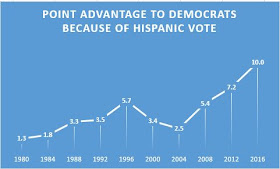Here's a very simple graph with a very simple trend line:
The value it tracks over the decades is the percentage of men in the labor force. Every year this percentage declines and over a period of about 68 years, it has dropped from about 87% to about 69%, a fall of roughly 2.5 percentage points per decade. In no decade did it finish higher than it started.
I don't know why. I'll speculate at the end of this post but I do know that whatever is going on, it didn't just start in the last few years. It likely started before your career did.
Here's another simple graph and another simple trend line:
Between 1946 and 2000, women were joining the workforce at a faster rate than men were leaving. During that time, the participation rate of men dropped 11.6 points, from 86.7% to 75.1%. Meanwhile, women's participation rate rose 28 points, from 32% to 60.1%.
Why did women's participation rate rise? I don't know. The simplest explanation seems to be the pill, birth control options that let women delay careers for four to six years to get an education rather than for 20 to 30 years to raise children. Advances in contraception and female enrollment in schools (Yale only began to admit women in 1969) meant that women could plan families and careers in a way that let them choose one or the other or both.
The net effect of women joining the workforce faster than men were leaving was to drive steadily higher participation rates. Overall labor participation rate looks like this:
A question you might have reasonably asked in 2000 was whether women would continue to enter the workforce at a faster rate than men were going to leave it. I suspect that any reasonable person would take about five minutes to think this through and say, "Well at some point the rate at which women are joining the labor force will level off. It can't go above 100% and it's likely to stall out considerably short of 100%"
That seems like a reasonable thing for hypothetical you to have said and if you look at the labor force participation rate since, you'll see two things.
One, the rate at which men are leaving the workforce is still dropping off, and at about the same rate that it was last century.
Once we hit 2000, women's rate of participation began to drop off at a similar rate.
Women have possibly entered a plateau relative to men and have now joined them in their steady, decades long drop in participation rates.
The net effect is that labor force participation rate has dropped since 2000.
It would be foolish to think that the Great Recession and its aftermath hasn't impacted the rate of labor force participation for men and women. As I've mentioned so many times, in the last three decades of the 20th century, the American economy created 18 to 20 million jobs per decade. In the first decade of this century, it destroyed 1 million. That is going to impact everything from median income and unemployment numbers to labor participation rate. That said, a deeper trend than what would be explained by any boom or bust seems to be playing out here.
Here are some possible reason that the labor force participation rate is dropping every decade.
More Leisure Time:
It might be what the technologists were enthused about a century ago: a future in which people have to work less.
In 1900, the average work week was nearly 60 hours. By 1950, it was just over 40 and people had more material goods and services than were imagined in 1900. Perhaps the drop in labor participation rate since 1950 shows a further continuation of this trend of needing fewer hours to get what we want and rather than showing up in shorter work hours it is showing up in a smaller workforce.
More Education:
The labor force participation rate is for people over 16. In 1900, fewer than 10% of 14 to 17 year olds were formally enrolled in education. Now, roughly half are in college or university at 18. As people are in school longer, labor participation rates drop.
Earlier Retirement:
A growing portion of the population makes a lot of money. Sometimes they spend this on bigger houses. Sometimes they spend this on earlier retirement. It's conceivable that people are dropping out of the workforce earlier as people become more affluent.
Unqualified to Work:
Once upon a time, you could find work for anyone who wasn't seriously disabled. Increasingly, machines are automating work, from digging ditches to dispensing cash. The requirements for performing typical jobs may have gone up in terms of problem-solving ability, etc. It's conceivable that a growing portion of the population is unable to contribute enough value to justify paying them even minimum wage, leaving them out of the workforce.
Video Games are More Engaging than Work:
It could be that we seek out flow experiences and leisure - from video games and spectator sports to hiking in the woods - now offers more joy than work. Beyond a certain income level, people would rather put themselves into play than work. Video game designers know how to fully engage us; efforts towards the gamification of work, by contrast, have only begun. We want to be engaged and it's harder to find that in work and easier to find that in leisure.
I don't know why participation rate is dropping but I do know this: any deeper reason will have to explain the data since 1948, not just 2008, because that is when the data began to show this trend.
 In 2004, the state legislature defeated a constitutional amendment that would have struck down Section 256 from Alabama's constitution.
In 2004, the state legislature defeated a constitutional amendment that would have struck down Section 256 from Alabama's constitution.

















